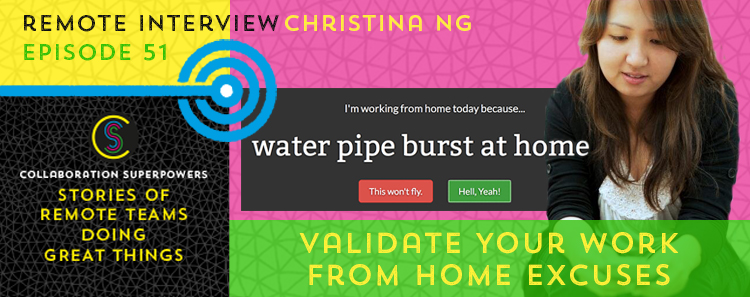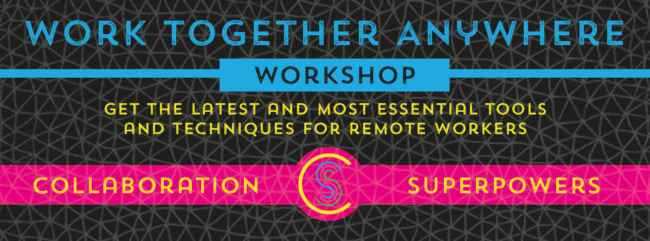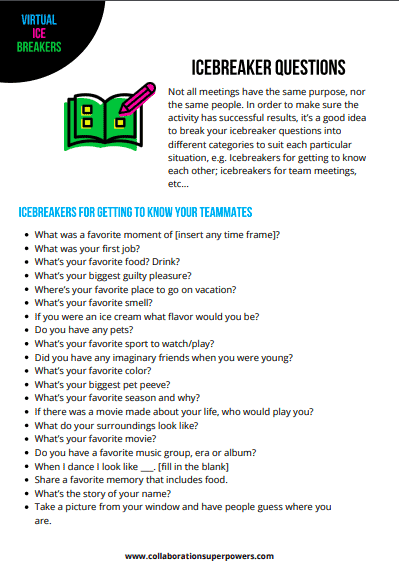
CHRISTINA NG is software developer and director of product at Dynamic Signal. This technology company offers a mobile-first company communications platform. Just for fun, she also developed a work-from-home excuse generator: when a user submits an excuse, an online community votes on it – up or down.
Subscribe to the Collaboration Superpowers Podcast on iTunes or Stitcher.
Podcast production by Podcast Monster
Graphic design by Alfred Boland
Original transcript
Lisette: Great, and we’re live. So welcome everybody to this remote interview. My name is Lisette, and I’m interviewing people and companies doing great things remotely. And I’m totally excited today because we have something a little bit different. Today I have Christina Ng from… I think you’re in the Bay Area. Is that right? Are you in San Francisco?
Christina: Yeah, actually, a little bit south of San Francisco and Silicon Valley.
Lisette: Okay, great. And you’ve built a very interesting website, which first actually caught my boyfriend’s eye on Reddit. And then he sent it to me and said, “You’ve got to check this out.” And it’s the wfh.ninja, workfromhome.ninja. And it’s an excuse generator in some ways where you say I’m working from home today because… and then you enter your excuse. But I’ll let you describe it since you built it. What is this website and what does it do?
Christina: Basically, it’s an excuse generator for people who want to work from home or work remotely. And the whole idea is that you can go on the website, and every time you go, you see a different excuse. And you can vote up or down depending on whether you think the excuse is going to fly with your boss. And when a bunch of people come in and vote, you kind of get these crowdsource results on what people think are generally the best or the worst excuses. And if they feel creative enough, then we welcome submissions. And I have received tons and tons and tons of submissions on people’s creative work-from-home reasons. Well, not all of them are actually in rotation, but the ones that I’ve seen are pretty good.
Lisette: So the ones that are in rotation, are these the ones that get upvoted the most by people?
Christina: Yes. Beyond a certain point, it’s like -5000. Then obviously, it goes out of rotation. There’s also a lot of submissions that were just not that appropriate. So they didn’t get [crosstalk – 00:02:00] make it into a fun site like Work From Home Ninja because I want to make it, keep it like PG. But other than that, [crosstalk]. Yeah [crosstalk] really interesting to see what people come up with.
Lisette: Super. So I want to get into some of the top excuses and some of the excuses you’ve received. But why did you build this? What was the reason?
Christina: Well, the original reason why I built it was I’m a huge fan of video games. And I live with two other boys who are my housemates. And we all play games together almost every night. So that was one night where we were like playing until really late. And we’re really tired. And I’m like, “Oh, I don’t want to go to work tomorrow. Let’s just work from home.” But we need to find a valid reason why we should be working from home tomorrow. So then we just started talking about all these reasons that our co-workers, our past co-workers, actually came up with – ranging from a bunch of them… We actually use the original content on the website before people came. We actually see that content from real-life excuses that we’ve seen in the past. And we’re like, “Oh no, that’s not going to work,” or, “Oh wait, that excuse is great.” So we’re like, “Hey, why not let’s crowdsource this and see what the general public is going to think about all these work-from-home excuses. So it was kind of like a parody because obviously, work from home is something that is very supported in the Bay Area for better work-life balance. But I just thought it would be a fun thing to build. And at the same time, I was trying to pick up more technical chops. So that was like a good exercise for me to build something concrete.
Lisette: So it seems like it got pretty popular. I mean it’s on Reddit. And I think The Next Web has contacted you. So why do you think it’s so popular?
Christina: I think it’s wacky in some way. And it really touches the heart strings of many people, especially in the Bay Area. In the tech sector, we really do see a lot of people working from home, but sometimes they may not be having the best reason to do so. I think timing was also really important. I released it on a Sunday evening. And Mondays, people usually face Monday blues. So having this work-from-home excuse come out on a Monday in Business Insider and The Next Web was just something really wacky and interesting and lightened people’s Monday’s up. And I guess that’s the way it got picked up.
Lisette: Yeah, I love it. And let’s talk about some of the excuses that you’ve gotten. And you sent me a list. I don’t know if it’s open to the public, but you’ve sent me this list. And the top one is a doctor’s appointment.
Christina: [Laughs] Because the site is still live and the score is still live, 8 out of the top 10 were medical related excuses. So when I first built the site and when I first released it, I kind of thought that hey, maybe people would just appreciate the humor, appreciate a parody, and come up with really wacky excuses. We had some people who said like, “Oh, I’m working from home today because Uber is on surge pricing, like really wacky reasons. But as more and more people came to the site, I like that people were actually taking it pretty seriously. The ones that got upvoted were pretty legit reasons that you would think would be valid, whereas those super wacky reasons got downvoted to the bottom – which is cool because once you get the masses coming in, people actually took it pretty seriously.
Lisette: Interesting. And I find it very interesting that a lot of managers don’t allow people to work from home because they don’t trust that they’re actually going to be working or that they actually need to work from home. And I think what we’re seeing here, what you’re saying is true that these real reasons are getting upvoted, that people really need to work from home for some pretty valid reason.
Christina: Yeah, definitely. I’m a huge proponent of remote work as well myself. In fact, previously, I worked for a company that allowed remote work. And I was working remotely for more than a year. And it was a great experience. But of course, I think a lot of it has got to do with trust. What’s interesting is that a lot of the reasons that were submitted, people were just flat-out saying that I’m working from home today because it’s just more productive. There’s less distractions than in an office. I can work better at home. Internet is better. The more wacky ones will say, “Oh, the coffee is better. The temperature is better.” But ultimately, it really comes down to personal productivity. And I’ve seen a lot of people contribute reasons that simply just flat-out say that I’m just more productive at home.
Lisette: Yeah, there’s a lot of interruptions at the office: the meetings and people wandering by and things going on. It’s interesting because you think there’d be a lot of distractions at home. I mean there’s dishes that need to be done and laundry stuff and things. But it seems like people are really more productive at home. So 8 out of 10 are medical excuses. So I find that pretty interesting. You can’t really go against the medical excuses.
Christina: Yeah. There was a really funny one. This one was the most downvoted reason which I thought was really funny because it’s super meta. And the reason is I’m working from home today because my side project blew up on Product Hunt, which was kind of meta because it was kind of referring to the whole Work From Home Ninja blowing up on Product Hunt. So I was like that’s funny. That’s probably an excuse I could use.
Lisette: Yeah, you personally. That was the most downvoted excuse that we had.
Christina: Yeah, that was the one. And then we had other ones like, “Oh, my car ran out of gas,” or, “My microwave is broken,” or, “My college roommate is in town.” So kind of like suggesting that you were going to go out and have fun instead of working. So those were the ones that didn’t do so well.
Lisette: Interesting. So those are actually the ones that got downvoted, whereas the ones that got upvoted were actually legitimate reasons. So this site now could be used for evil. If people are looking for really good reasons to tell their boss, they can [crosstalk – 00:09:03] reason? What can I get away with?
Christina: [Laughs] I’m sure people kind of know already what’s valid and what’s not. And I think that with the results you have shown that people actually do kind of know, since the valid reasons are voted up and the not-as-valid reasons are voted down. But I think ultimately, it’s just really about personal discipline and getting work done. I don’t think that you need a reason to work from home as long as you get the work done before when you’re supposed to have it done. Then why does it matter where you’re working? You could be in the office. You could be at home. You could be on a beach. What matters is what results you produce.
Lisette: And how does your company know what you’re doing?
Christina: Well, we all have deliverables. And no man is an island. We all work in teams. So you’re depending on one another. So as long as you’re not blocking someone, you complete your deliverables, you submit your deliverables, you work together with your team, there’s good communication within your team, location really doesn’t matter.
Lisette: And what do you think the main reason is that people are resisting working from home that you’ve seen in places that you’ve worked?
Christina: One is, of course, discipline. I think working from home takes a very different personality and a very strong discipline. So as you said, there’s also plenty of distractions at home. So it’s really up to the individual to be self-disciplined and to really work when they say they’re working since there’s no one looking over your shoulder to make sure you’re not surfing Facebook or whatever.
Second is really culture. I think the company needs to have a culture that supports remote work, and that means having the necessary tools and infrastructure for communication – whether it’s [internal – 00:11:13] chatting tool like HipChat or Slack, or the way we send emails, the way we make decisions. The worst thing that you want or the least ideal situation is that you have a bunch of people in the office and a bunch of remote people. And some discussions happen in the office that the remote people get excluded from. And they don’t really know what’s happening, and there’s no good communication. So that’s when things start breaking down. But if people can make a conscious effort to say, “Okay, if we want to make this decision and people who are remote are involved in this decision, then we should get them involved in this discussion – instead of making the decision first and then informing them about it later.”
Lisette: Right. Where do you think businesses go wrong in creating this kind of culture where people are responsible for their work?
Christina: I think the issue is there’s not enough culture to communicate and to document things, because it’s so much easier to just walk over to the next cubicle or to the next cable and just talk to your co-worker and just make a decision right there and then – especially for startups when things move so fast that you just need to get things out as soon as possible. But it really takes a different kind of culture to say that every discussion that you have, make sure that the people who are involved are there. If they’re not there, everything gets documented and stored somewhere so that people who are not actually there can read up on it, can figure out what actually happened.
Lisette: Right. So everybody is on the same page and doing things together. So what have you learned from doing this project? Besides from the technology, although that’s interesting. So if you want to talk about that, feel free. But what have you learned from this project?
Christina: I personally have been working on startups. And I helped in a couple of product launches. But I never really knew how to quantify if a product launch was successful. So what I see is that all the data that I’ve gathered from this product launch, I see it kind of like a benchmark. In future, I want to launch a real product, an actual product [inaudible – 00:13:48] startup. At least I know this is the bar that I need to meet. Or if I exceed this bar, then it’s really good. Or if I don’t hit this bar, at least that’s the goal that I know that I set that I want to reach.
Lisette: How did people learn about this website? How did you get it out into the world?
Christina: I actually built this website two months ago. I showed it to a couple of friends. They all enjoyed it. They contributed more excuses. And then one day I just decided to put it up on Hacker News. So Hacker News has got this section called show [each end – 00:14:29], show Hacker News. So I just said, “Hey, I built this website to crowdsource the best work-from-home excuses.” So then that gained some traction. I put it up on Product Hunt. And the funny thing was that when I put it up Product Hunt for the longest time, there were only four upvotes. One was me. One was my boyfriend. Another one was my friend. And the last one was Ryan Hoover who’s the founder of Product Hunt. And so when he upvoted it, I was, “Oh my God! He upvoted my project.” And it was like a mini fangirl moment. But it then really got much traction for the first seven, eight hours. But then I went to bed. And the next thing I knew when I woke up, it had already blown up.
Lisette: Wow!
Christina: It was totally surprising.
Lisette: Super interesting. So people just found it, and it just went crazy.
Christina: Yeah, somehow after the [inaudible – 00:15:28] reported on it – Business Insider reported on it – it became front page on Hacker News, front page on Product Hunt, front page on Reddit. It just went everywhere.
Lisette: Wow! And what do you think the attraction is for all these people that see it? I mean I had the same… I can tell you from my perspective. From Business Insider and these places, what was the excitement when they contacted you?
Christina: I think it was just something really wacky. It’s a topic that has been discussed quite a lot, like working from home, work-life balance. It’s an interesting topic. It was also a Monday where everyone was trying to counter Monday blues. And one other interesting statistic that I saw was that the engagement rate on the website was actually super high. People actually voted like… I think it was 80 percent or something, voted at least 10 times. The reason for that was because every time you go to the website, you see one excuse. And in order to see the next excuse, you have to vote at least once. You have to vote up or you have to vote down. So people were motivated to vote in order to get the payoff, which was to see the next excuse. And since the excuses were funny enough or wacky enough or interesting enough, people would just keep voting up and voting down just to see more and more excuses.
Lisette: Wow! So it’s kind of addictive.
Christina: Yeah. It was really interesting to see the statistics because people were actually really engaged on the product.
Lisette: Fun. And do you have any plans for developing it further? I don’t [crosstalk – 00:17:16] but I don’t know. [crosstalk].
Christina: Well, it’s not going to be a real startup, probably, but it’s still going to be a site project. I have some plans to make additional features. For example, we have some weather-related excuses like, “Oh, I can’t go to work today because I’m snowed in,” or, “I can’t work today because there’s a major traffic accident.” So those don’t apply to everyone. So one of the things I wanted to do was maybe be able to pull some location information or weather information based on where the user is, so that we could present excuses that were more relevant for them. So if you were in Alaska, then maybe something about being snowed in would be more relevant to you compared to someone who’s living on the equator.
Lisette: Right. So it’s location-based excuses [laughs].
Christina: Or conditions-based excuses.
Lisette: Conditions-based excuses, this is going to be brilliant. Oh, it’s so great. And are you planning on publishing the results for people to see?
Christina: Yeah. If you go to wfh.ninja/summary, I actually compiled the list of top or worst work-from-home excuses that are in active rotation. So every time you go to the site, hopefully, the number is different because it’s a live site and as people vote up or down, the numbers actually get updated automatically.
Lisette: And there are some great excuses here. You can get hit by a hockey puck last night. There’s a hurricane approaching. It’s a serious case of neck ache.
Christina: Yeah. There’s some really interesting ones, like the Uber one that I talked about. Homejoy, which is this startup that sends cleaner to your house. This one that says Homejoy is cleaning my house. I’m tired of sitting in traffic, waiting for PG&E, which is a gas company, to come install something [crosstalk – 00:19:24].
Lisette: Funny. Well, this is super interesting. It’s fun to see. And clearly, you’ve hit a note here. You’ve struck a chord with people. Whether it’s the Monday blues or people needing excuses or just wanting to be more creative, clearly, this is on the minds of people. So it’s very exciting. And I’d like to say for people who are listening, if you have questions now or in the future, you can always tweet them to #remoteinterview, or of course tweet directly, but this one is always up. So now in the future, if you have questions for Christina, then let us know. And Christina, is there anything else that I’ve missed in terms of asking you things or things that you want people to know about this product or this website?
Christina: Well, if they’re bored at work or facing Monday blues, they should definitely go to wfh.ninja and upvote or downvote on some excuses. And if they have something they think it’s really creative or a really good reason, they should definitely submit it on the website.
Lisette: Right. So you can help the rest of us out in the world if we need an excuse [crosstalk – 00:20:27] good excuse. I really appreciate talking with you. I really have a lot of joy in looking at this website. I thought it was a really great idea. So thanks so much for your time.
Christina: Thank you. I appreciate it as well.
Lisette: All right, everybody. Until next time, be powerful.



